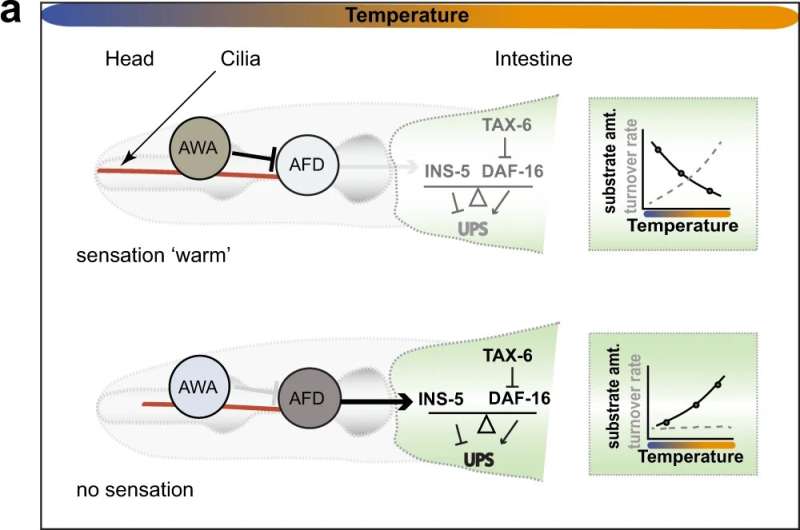Sensory temperature perception and proteostasis regulation. a In WT worms, external stimuli, such as warm temperature, are perceived and processed normally via sensory neurons such as AWA (and possibly other sensory neurons, including ASH), reducing AFD signaling (sensation ‘warm’). The red lines schematically show the length of all cilia, which are longer in WT, whereas the distal segments are absent in the dyf-1(mn335) mutant. UPS function in the intestine does not primarily depend on INS-5 or calcineurin signaling. Thus, WT worms increase their protein degradation in response to warm temperature (dotted line in the graph), resulting in decreased amounts of proteasomal substrates (substrate amt. dark line) at higher temperature (substrate amt. dark line). dyf-1(-) mutant worms exhibit defects in distal cilia formation and are unable to properly sense ambient temperature (no sensation) due to decreased AWA function creating a neuronal signal that involves the aberrant function of the AFD neurons which fail to sense the ambient temperature correctly (indicated by black arrow). This signal includes DCV secretion and the neuropeptide FLP-3 that blocks the UPS in the intestine. The induced AFD signal increases INS-5 to reduce UPS function. In parallel, tax-6 loss-of-function is tipping the balance towards the action of DAF-16 to control the UPS. Hence, dyf-1(-) worms fail to adjust their protein degradation rate (dotted gray line in the graph) due to loss of temperature sensation and accumulate proteasomal substrates (dark line in the graph). Credit: Nature Communications (2022). DOI: 10.1038/s41467-022-33467-7
Scientists from the group of Professor Dr. Thorsten Hoppe at the Cologne Cluster of Excellence for Aging Research CECAD have found that in the nematode C. elegans, the perception of changes in ambient temperature via a defined network of sensory neurons is important for the maintenance of protein degradation in the gut.
While wild-type worms increase their protein degradation in response to elevated temperature, worms lacking the perception of elevated temperature due to a mutation do not adjust their protein degradation rate while showing an extended lifespan. The researchers published their findings in Nature Communications.
To maintain and improve their chances of survival, organisms must constantly adapt to changing environmental conditions. The perception of the external environment is mediated by sensory neurons and is crucial for maintaining the balance of physiological body functions, known as homeostasis.
Cellular protein homeostasis is achieved by maintaining a complex balance between protein synthesis, protein folding, and protein degradation. Dysregulation of protein homeostasis is associated with a variety of age-related protein folding diseases, in which misfolded proteins are not degraded and accumulate in cells, which can affect neuronal functionality as well.
The authors used the nematode C. elegans to investigate how a general impairment of environmental perception affects protein degradation. To do this, they used worms whose sensory neurons, by means of mutations in genes that control the functionality of these neurons, are impaired.
They found that specifically, the perception of changes in ambient temperature via a defined network of sensory neurons is important for maintaining protein degradation in the gut via the insulin-like signaling factor INS-5 and the calcineurin-signaled FOXO transcription factor DAF-16. While wild-type worms increase their protein degradation in response to elevated temperature, worms lacking the perception of elevated temperature do not adjust their protein degradation rate while exhibiting an extended lifespan.
"According to this, it is not the temperature in the organism's environment per se that influences protein degradation and the lifespan of the nematode, but rather it is the neuronal perception and processing of temperature stimuli that adjusts its protein degradation," says first author Dr. Alexandra Segref.
In light of current climate changes, it is of importance to determine how a chronic increase in temperature affects these signaling pathways and thus protein degradation and lifespan in higher organisms.
"Interestingly, neurological damage in patients with neurodegenerative diseases can be reduced or even averted by severe cooling of the brain, however it is still completely unclear how this works. Our data suggest that the degradation of proteins as a consequence of the perception of temperature stimuli is an important factor that could be therapeutically relevant," says Professor Dr. Thorsten Hoppe.
More information: Alexandra Segref et al, Thermosensation in Caenorhabditis elegans is linked to ubiquitin-dependent protein turnover via insulin and calcineurin signalling, Nature Communications (2022). DOI: 10.1038/s41467-022-33467-7
Journal information: Nature Communications
Provided by University of Cologne
























